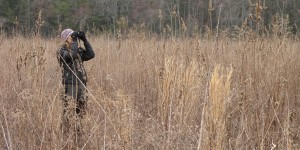
Fish & Wildlife Service biologist Sue Cameron conducting the first known bird inventory at newly restored bog in Henderson County’s Rutledge conservation partnership area. Gary Peeples/USFWS photo
Mountain bogs are some of the rarest and most imperiled natural habitat in the country. They are generally small and scattered across the landscape often isolated from other wetlands. This isolation can create unique habitats, which in turn create unique flora and fauna. Bogs are home to several federally endangered and/or threatened species including bog turtles, mountain sweet pitcher plant, bunched arrowhead, swamp pink and others.
And while bogs may be small and scattered they are also crucial intricate pieces of the larger landscape puzzle. Their ability to soak up and hold large quantities of water make them natural flow regulators decreasing the impacts of both flooding and drought. They also provide nesting and foraging habitat for many Neotropical migrants like golden-winged warblers, prairie warblers and Swainson’s warblers, plus resident birds like American woodcock, wood duck, wild turkey and ruffed grouse. Mink, beaver, meadow jumping mouse, common ribbon snake plus numerous frogs and salamanders are just some of the animals that utilize bogs in the Southern Appalachians.
The U.S. fish and Wildlife Service, recognizing the unique character of these mountain oasises, and the fact they are disappearing from the landscape, has proposed establishing a refuge that would protect a number of Southern Appalachian bogs. According to Rick Huffines, deputy regional chief, National Refuge System in a recent press release, “Given the rarity of these bogs and their importance to plants and wildlife, creating a refuge to conserve them is a natural fit.”
The press release notes that the proposed refuge would eventually include about 23,000 acres across North Carolina and eastern Tennessee. Thirty sites have been identified in Alleghany, Ashe, Avery, Clay, Graham, Henderson, Jackson, Macon, Transylvania, Wilkes, and Watauga counties, North Carolina, and Carter and Johnson counties, Tennessee. U.S. Fish and Wildlife would work with willing landowners using a variety of tools including fee simple purchases, conservation easements, leases and/or other cooperative agreements. Funding for the project would most likely come from the Land and Water Conservation Fund.
“A 23,000-acre refuge won’t be created overnight,” noted Huffines. “Many organizations have been involved in protecting bogs for years. Now we’re expanding that conversation to hear from other landowners who might be interested in helping conserve these areas. It’s going to be a long process, based on trust and a deep understanding by all involved.”
The proposed Mountain Bogs National Wildlife Refuge has numerous goals including; protecting some of the last remaining examples of Southern Appalachian bogs; conserving habitat for migratory birds, including several of conservation importance, such as golden-winged warbler, Swainson’s warbler, and yellow-bellied sapsucker; protecting habitat for multiple federally threatened and endangered species; protecting breeding and migration habitat for the American woodcock, a game bird that has seen dramatic declines in recent years; and where compatible, provide increased opportunities for wildlife-oriented recreation such as hunting, fishing, wildlife observation and photography, education, and interpretation on land now generally closed to the public.
Fish and Wildlife is currently seeking public input on the proposed refuge. People can e-mail comments to mountainbogs@fws.gov; mail comments to U.S. Fish & Wildlife Service, 160 Zillicoa St., Asheville, NC 28801; or telephone comments to 828/258-3939.
There are also a number of open houses scheduled across the region where people can learn more about the proposed refuge – June 26, 5:30 p.m. to 7:30 p.m. at the Henderson County Public Library in Hendersonville, N.C.; June 27, 4:30 pm. to 6:30 p.m. at the Ashe County Public Library in West Jefferson, N.C.; July 10, 5:30 p.m. to 7:30 p.m. at the Macon County Public Library in Franklin, N.C.; and July 11, 4:30 p.m. to 6:30 p.m. at the Watauga County Public Library in Boone, N.C.
